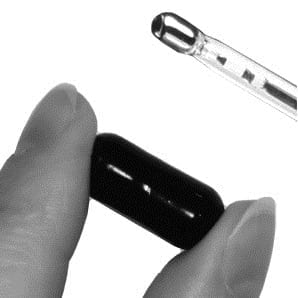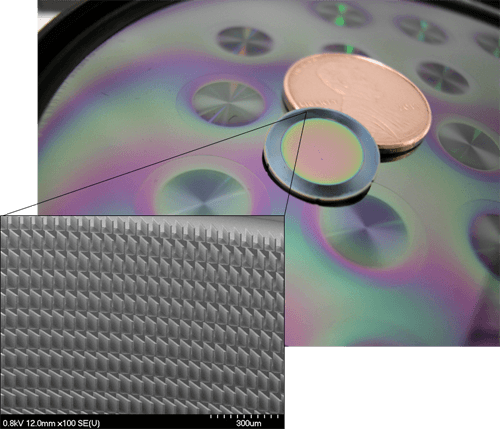
They look like normal pills, oblong and a little smaller than a daily vitamin.
But if your doctor writes a prescription for these pills in the not-too-distant future, you might hear a new twist on an old cliché: “Take two of these ingestible computers, and they will e-mail me in the morning.”
As society struggles with the privacy implications of wearable computers like Google Glass, scientists, researchers and some start-ups are already preparing the next, even more intrusive wave of computing: ingestible computers and minuscule sensors stuffed inside pills.
Although these tiny devices are not yet mainstream, some people on the cutting edge are already swallowing them to monitor a range of health data and wirelessly share this information with a doctor. And there are prototypes of tiny, ingestible devices that can do things like automatically open car doors or fill in passwords.
For people in extreme professions, like space travel, various versions of these pills have been used for some time. But in the next year, your family doctor — at least if he’s technologically adept — could also have them in his medicinal tool kit.
Inside these pills are tiny sensors and transmitters. You swallow them with water, or milk if you’d prefer. After that, the devices make their way to the stomach and stay intact as they travel through the intestinal tract.
“You will — voluntarily, I might add — take a pill, which you think of as a pill but is in fact a microscopic robot, which will monitor your systems” and wirelessly transmit what is happening, Eric E. Schmidt, the executive chairman of Google, said last fall at a company conference. “If it makes the difference between health and death, you’re going to want this thing.”
One of the pills, made by Proteus Digital Health, a small company in Redwood City, Calif., does not need a battery. Instead, the body is the power source. Just as a potato can power a light bulb, Proteus has added magnesium and copper on each side of its tiny sensor, which generates just enough electricity from stomach acids.
As a Proteus pill hits the bottom of the stomach, it sends information to a cellphone app through a patch worn on the body. The tiny computer can track medication-taking behaviors — “did Grandma take her pills today, and what time?” — and monitor how a patient’s body is responding to medicine. It also detects the person’s movements and rest patterns.
The Latest Bing News on:
Pill sensors
- 5 Futuristic Smartphone Features That Would Be Gamechangerson April 27, 2024 at 3:15 pm
In its ideal form, this notion could let us perform all kinds of tasks with only the most minute of gestures. With a snap of your fingers, you could record a video on your phone's camera, then fire it ...
- 30-year-old supercommutes over 500 miles to work in New York: ‘I'm the happiest I've ever been’on April 26, 2024 at 6:05 am
Hairstylist Kaitlin Jorgenson commutes four-plus hours by plane twice a month from Charlotte, North Carolina to work in New York.
- 12 Solo Travel Essentials a Guidebook Author and Content Creator Swears by for Every Trip, From Just $14on April 26, 2024 at 3:00 am
Her genius picks include a personal safety alarm and an anti-theft crossbody bag.
- Mental health crisis centers and EmPATH units: offering care that busy ERs can’ton April 26, 2024 at 1:30 am
As national awareness of mental illness rises and innovative care models emerge, many advocates now see a rare opportunity to remake mental health crisis care for the better.
- A Collier deputy testified about his on-the-job fentanyl overdose. Did it really happen?on April 25, 2024 at 2:32 am
Medical experts have voiced concerns that a new fentanyl exposure law could dissuade people from calling 911 for help during an overdose ...
- Divided Supreme Court wrestles with Idaho abortion ban and federal law for emergency careon April 24, 2024 at 4:38 pm
The Supreme Court heard arguments in a case that pits Idaho's near-total abortion ban against a federal law that requires hospitals to offer emergency care.
- Sammy’s Law in California seeks to protect youth from social media drug saleson April 24, 2024 at 2:13 pm
After their son died from a fentanyl pill purchased on social media, Sammy Berman and Laura Chapman fight for change.
- After Clarence Thomas Says Contraception Ruling Needs Revisiting, Advocates Express Alarm About Threat To Birth Control Access From GOPon April 24, 2024 at 7:57 am
Marjorie Taylor Greene (R-Georgia) challenged the president’s statement and asserted that “MAGA Republicans” are not trying to obstruct women’s access to contraceptives and that Biden shouldn’t ...
- First real-life Pixel 9 Pro pictures leak, and it has 16GB of RAMon April 22, 2024 at 10:44 am
The usual timeline would put the Google Pixel 9 at something like five months away from launching, but that doesn't mean it's too early to leak! Real-life pictures of the "Pixel 9 Pro" model have ...
- LeBron James leaks return of Beats Pill speakeron April 21, 2024 at 7:53 am
NBA superstar LeBron James was spotted at Saturday's playoff game in Denver sporting what appears to be a unreleased Pill speaker from Apple's Beats subsidiary.
The Latest Google Headlines on:
Pill sensors
[google_news title=”” keyword=”pill sensors” num_posts=”10″ blurb_length=”0″ show_thumb=”left”]
The Latest Bing News on:
Ingestible devices
- Drinkable beauty: OZiva launches fizzy drink with glutathione to quench skincare needs in Indiaon April 23, 2024 at 6:57 pm
Indian plant-based nutra brand OZiva’s has launched a Bioactive Gluta fizzy drink to target common skin concerns in the country and to tap into growing demand for glutathione.
- Revealed: Get The Gloss Wellness Awards 2024 finalistson April 23, 2024 at 12:46 am
From the best destressing body oils to savvy sleep supplements and power protein shakes, these are the 187 best wellness buys for 2024, according to our expert judges ...
- Internet of Things in Healthcare Market to Surge to USD 471.20 Billion by 2031: Industry Analysis, Technologies and Competitorson April 22, 2024 at 8:48 am
Internet of Things in Healthcare Market to Surge to USD 47120 Billion by 2031 Industry Analysis Technologies and Competitors ...
- How Financial Service Companies Are Using Phone Number Data to Mitigate Fraudon April 22, 2024 at 7:00 am
With mobile phones expected to become the primary source of identity for billions of people this year, phone numbers are the logical way for businesses to contact and authenticate customers. They’re ...
- What pharma stands to gain from technological innovationon April 22, 2024 at 3:33 am
For example, take IMU technologies, geo-positioning, and actigraphy, which can now be used to monitor movement and gross motor function without ever coming into contact with the patient. Thanks to ...
- 6 Expert-Approved Ways to Strengthen Your Nails After a Gel Manicureon April 18, 2024 at 7:22 am
We asked nail experts how to strengthen damaged nails after gel polish. Here's your guide to getting stronger nails.
- Wellness Is the Hot New M&A Targeton April 15, 2024 at 10:00 pm
According to sources, it's early days, but potential targets in the future include cycle syncing brand Rael, which raised $35 million in 2022; supplement and personal care brand Love Wellness, created ...
- The 16 Best Wellness Brands to Shop Nowon April 15, 2024 at 2:44 pm
Founder Trinity Mouzon Wofford launched Golde out of her one-bedroom apartment in Brooklyn in 2017 with a single product: the now-viral Original Turmeric Latte Blend. Since then, the brand has ...
- Tiny ingestible beads could help fight liver disease: studyon April 15, 2024 at 9:17 am
Tiny ingestible carbon beads could help fight liver disease and keep our guts healthy, a new study has revealed. The newly invented beads, each smaller than a grain of salt, were found to reduce bad ...
- Carbon beads help restore healthy gut microbiome and reduce liver disease progression, researchers findon April 14, 2024 at 4:00 pm
Innovative carbon beads, invented by researchers at UCL, reduce bad bacteria and inflammation in animal models, which are linked to liver cirrhosis and other serious health issues.
The Latest Google Headlines on:
Ingestible devices
[google_news title=”” keyword=”ingestible devices” num_posts=”10″ blurb_length=”0″ show_thumb=”left”]










